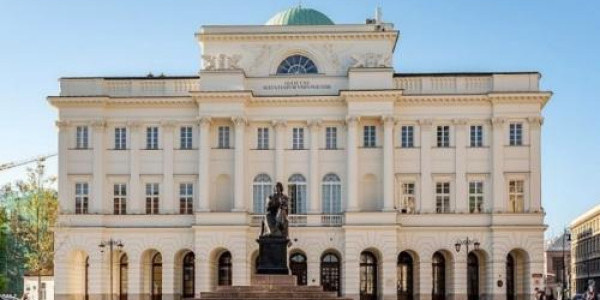Researching the Holocaust in the Digital Age
EHRI Academic Conference Warsaw 2024
18/06/2024 | Na stronie od 07/06/2024

Image of Staszic Palace by Tilman2007 - Own work, CC BY-SA 4.0, https://commons.wikimedia.org/w/index.php?curid=62112573.
Source: EHRI
Polish Center for Holocaust Research, Staszic Palace, Warsaw, Poland
The registration for this conference is closed.
The conference will be live-streamed – more details about this will follow on this website.
You are invited to attend this event for which you can find the preliminary programme below.
You can expect an international conference for archivists and researchers evaluating Holocaust-related research in the digital age, the current state of documentation and study of the Holocaust, and the role that EHRI plays in supporting and advancing these areas.
In October 2023, EHRI published a Call for Proposals for this conference, which resulted in many excellent submissions. The conference will feature conference papers as well as a ‘marketplace’ of poster presentations relating to both Holocaust research and EHRI’s future development in Europe and beyond.
- Please note that the conference including lunch and walking dinner is free, but travel and accommodation are reimbursed only for speakers.
- If you have any questions, please email p.drenth@niod.knaw.nl.
FINAL PROGRAMME
- 09:15 – 10:00 Coffee and Registration
- 10:00 – 10:05 Welcome
- 10:05 – 10:20 The European Holocaust Research Infrastructure (EHRI)
- 10:20 – 12:00 New Digital Research Methods and Innovation
- 10:20 – 10:40 Reference and Information Services in Yad Vashem Archives - Opportunities and Challenges of the Digital Era - Yael Robinson Gottfeld, Yad Vashem, Israel
- 10:40 – 11:00 Cartographic Representation of the Krakow Ghetto: A Distorted Image of Tragedy - Stanislaw Szombara, AGH University of Science and Technology and Alicja Jarkowska, Jagiellonian University, Poland
- 11:00 – 11:20 Streamlining the Creation of Holocaust-related Digital Editions with Automatic Tools - Floriane Chiffoleau and Sarah Beniere, INRIA, France
- 11:20 – 12:00 Querying the Archive: Relational Database Design and the Study of Holocaust-Era Materials - Emily Klein, US Holocaust Museum Memorial, USA
- 11:40 – 12:00 Q & A
- 12:00 – 13:30 Lunch and Poster Presentations*
- 13:30 – 15:00 Exploring the Use of Digital Techniques in Holocaust Research (I)
- 13:30 – 13:50 Interacting with Restless Archive: Sustainability and Archival Aggregation in Long-Form Digital Storytelling Platforms - Simone Gigliotti, Royal Holloway, University of London, UK
- 13:50 – 14:10 Unveiling Patterns: Exploring Socio-Demographic Characteristics as Predictive Factors for Deportation of Jews Registered in Bruxelles in 1940, Using Binary Logistic Regression - Adina Babeş-Fruchter, KU Leuven, Belgium
- 14:10 – 14:30 Natural Language Processing Meets Holocaust Research - Martin Wynne, University of Oxford, UK
- 14:30 – 14:50 Digital Heritage Related to Nazi Persecution: Reactualisation of Collective Memory of the Holocaust through a Virtual Interactive Exploration Platform - Aliisa Ramark and Hector Lopez-Carral, Radboud University Nijmegen, The Netherlands
- 14:50 – 15.10 Q & A
- 15:10 – 15:40 Tea and Coffee Break
- 15:40 – 17:20 Exploring the Use of Digital Techniques in Holocaust Research (II)
- 15:40 – 16:00 Integrating Citizen Science in the Digital Age as a Sustainable Innovation in Holocaust Research: Participatory Research, Presentation and Transformation - Inka Engel, University of Koblenz, Germany
- 16:00 – 16:20 Digital Humanities and Multiscalar Approaches to the Holocaust: The Case of the Brest-Litovsk Ghetto - Boris Czerny, Université de Caen-Normandie, France
- 16:20 – 16:40 Mass Grave Investigations of Holocaust Victims in the Digital Age: Strategies for Searching in Ukraine - Daria Cherkaska, Staffordshire University, UK
- 16:40 – 17:00 Memory Wars and Digitized Denialism: The Rehabilitation of a Romanian War Criminal - Adina Marincea, "Elie Wiesel National" Institute for Studying the Holocaust in Romania, Romania
- 17:00 – 17:20 Q & A
- 17:20 – 17:30 Closing Remarks
- 17:30 – 18:00 Drinks
- 18:00 - 20:00 Buffet Dinner
Poster Presentations:
- What Are Good Examples of the Opportunities for Holocaust Research in the Digital Age? The Example of Visual History Archives – Alessandro Matta, Sardinian Shoah Memorial Association, Italy
- "The Sunflower": Narrating the History of Wiesenthal's Book Through a Digital Online Edition – EHRI-Team (VWI), Vienna Wiesenthal Institute for Holocaust Studies, Austria
- Knowledge Modelling with Holocaust Testimonies – Isuri Anuradha, University of Wolverhampton - Isuri Anadhuri, Lancaster University, UK
- EHRI-NER: Multilingual Named Entity Recognition Resources for Holocaust-Related Texts – Maria Dermentzi, King’s College London, UK, and Hugo Scheithauer, Inria, France
- Project "Evaluating and Publishing Files on Compensation Cases" – Steffen Müller, Bundesarchiv, Germany
- Lost Lift Database – Jacqueline Malchow, German Maritime Museum, Germany
- The Language of Emotions in a Digital Project about the Holocaust – Pawel Rams and Agnieszka Zalotynska, Polish Academy of Sciences, Poland
More:
Projekt EHRI
Na stronie Projektu EHRI, realizowanym w ramach programu KE Horizon 2020, w którym ŻIH uczestniczy od 2010 roku, została opublikowana nowa podstrona z "raportami dyplomatycznymi”. Sprawozdania korpusu dyplomatycznego sojuszniczych, neutralnych i wrogich państw opisują prześladowania Żydów podczas II wojny światowej.
Diplomatic Reports
The online edition "Diplomatic Reports" focuses on how diplomatic staff reported the persecution and murder of European Jews during World War II. It contains documents by the diplomatic staff of (temporary) allies, opponents as well as neutral countries, reporting from countries under German occupation. Next to the documents and translations, the edition offers an introduction to the countries the diplomatic staff came from, highlighting their diplomatic relations before and during the war, the general character of the reports and the role that the persecution of the Jews played in them. Currently, the edition includes reports of the diplomatic staff from Denmark, Italy, Japan and the US. Foreseeable, reports by Hungarian, Slovak and Swedish diplomats will be added.